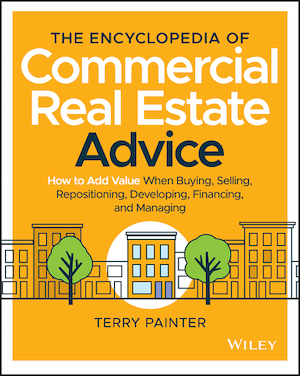The following is a guest post by Terry Painter, author of The Encyclopedia of Commercial Real Estate Advice. If you’d like to submit a guest post about investing in real estate or any other topic to Money Q&A, be sure to check out the site’s Guest Posting Guidelines.
In 2002, my client Conrad had a net worth of $230,000 when he called me for a loan to buy a 6-plex in Oakland. This was his first investment property. Today he is worth over $30 million. How did he do it?
First, he read a lot of books and took a course on investing in real estate and becoming the best real estate investor. Then, over the years, he did a combination of cash-out refinances and selling properties that had reached their potential to buy more property.
There is no other source of income that I know of that can grow wealth faster than investing in real estate in income-producing real estate. With your job, you have one income source—the paycheck. With stocks you have two—interest and dividends. With rental property, you have four, yes FOUR, sources of income: rental income, rental increases, appreciation, and getting a tax write-off with depreciation.
Can you believe there is actually a fifth one—reinvesting your equity by doing a cash-out refinance, or a 1031 tax deferred exchange. The latter allows you to sell a property and leverage your equity to buy a more profitable one that has more income and depreciation.
Learn How to Be the Best Investor
This is a business that takes a substantial amount of time, money, and expertise. So, start out by learning the business before you invest. The good news is that you can learn whatever you don’t know. There is so much free or low-cost education out there: Google, YouTube, and real estate investment books. The advice in my book, The Encyclopedia of Commercial Real Estate Advice, is just one of many in-depth books on the subject.
After studying how to invest in real estate, if your confidence isn’t quite there, consider hiring an experienced mentor or coach to guide you through your first deal. This will ensure that you avoid pitfalls.
Learn How Compute These 2 Metrics
Annual Cash on Cash Return (CCR)
What you really want to know when you find a property is how much the cash you invest is going to earn after you pay the expense and the mortgage each year. This is the annual net operating income from operations less the mortgage payment divided by the amount of cash invested in the property.
Annual Internal Rate of Return (IRR)
Next comes the big one, the Annual Internal Rate of Return (IRR): This is all the income from operations and appreciation combined after you eventually sell the property.
Learn How to Do Due Diligence
Due diligence is the research a buyer needs to do to determine the financial and physical condition of the property. Doesn’t sound like much fun, does it? But think about it like a relationship. Isn’t it important for you to really get to know a property before you get married to it?
This means you are going to have to dig much deeper than what the listing broker shows for income and expenses in the marketing flyer. Often these marketing pieces show a mixture of actual and potential income and expenses. Sometimes expenses are left out or underreported. You would not buy a business based on potential or inaccurate income, so why would you do this when buying investment real estate?
You need to evaluate at least 2-3 years of profit and loss statements or tax returns on the property to verify the property’s income. Look at month by month rent collections to make sure all tenants are paying the rent. Make sure to have an in-depth property condition report done to truly know the physical condition of the property.
What’s really important for a new real estate investor is to get involved in the nuts and bolts of their investment. This means not just relying on expert advice from professionals but studying as much as you can absorb about the type of real estate investment you want to make so you can make informed, intelligent decisions that you will be responsible for.
Then you need to dig into discovering the truth about the property you want to buy as if your life depended on it. It just might. Nobody will take care of your real estate investment better than an informed you.
Getting Started If You Don’t Have Much Money or Experience
Over the past 24 years, I have assisted dozens of new income property investors get started with very little money and experience by raising investors. This is not easy to pull off, but if you are willing to do the work I assure you it can be done. Here is a condensed version of the recipe I give in my book:
Find an Outstanding Property with 2 or More of These Upsides
1. It is in a good safe neighborhood. 2. It is priced below market for its condition. 3. It already has enough Net Operating Income (NOI) to cash flow the mortgage payments. 4. The property has a strong repositioning upside.
This can include rents that are already under market, lower than market occupancy, or the need for inexpensive operational and cosmetic changes that will enable rents to be raised. Having 2 or more of these will get the attention of investors and lenders.
Raise At Least 10% of the Down Payment in Your Own Name
The one thing you can count on is that every potential investor will ask you how much you are putting into the deal. Do you really want to tell them “zero”? Whatever you have to do to raise this amount, whether it’s from a home equity line of credit, a cash-out refinance, or a loan from your parents, you really do need to accomplish this.
Bring in a High Net Worth Investor as Your First Partner
They will have the net worth, cash, and experience to make you look good to listing agents, sellers, investors, and lenders.
Create an Outstanding Executive Summary
This is going to be 4 pages or less and sell your deal for you to investors and lenders. Start out by creating a pro forma projecting the property’s annual cash on cash, and internal rate of return over the years you plan to own the property.
Then give a good description of the property with its location and access to major shopping and freeways. State what you are paying for the property, and the value adds you will be doing, and how much those will cost. Most importantly, estimate what the property will be worth in so many years. Be sure to mention risks and how you will lower them by taking precautions.
What I love about my job as a commercial mortgage banker is that I get to evaluate and put deals together every day. This is fun to me. After reading this article if the tasks involved go beyond just sounding interesting, but really get you excited, then go for it. The best way to learn how to invest in real estate is by working on real deals.
About the Author

Terry Painter is the author of The Encyclopedia of Commercial Real Estate Advice. He is the founder of Apartment Loan Store and Business Loan Store, two mortgage banking firms specializing in commercial lending in all 50 states since 1997.

